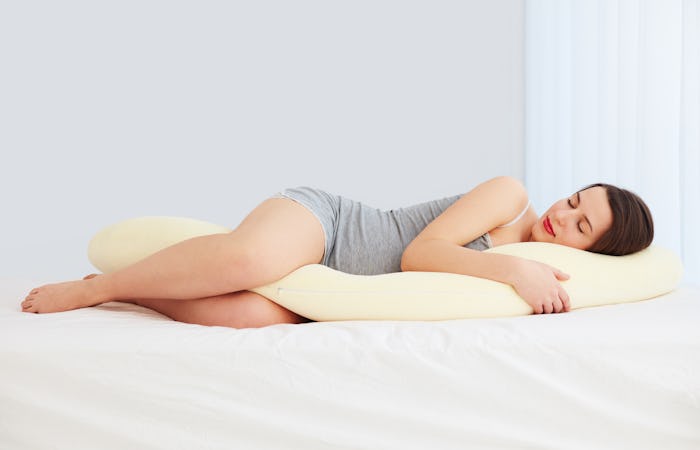Life

Actually, Doctors Say You *Do* Need A Body Pillow During Pregnancy
I can't tell you how many times someone told my pregnant self to enjoy sleeping — while I still could. It was ominous and weird, and people shouldn't talk like that. Also, I wasn't sleeping. I was too uncomfortable. My hip bones ground into the mattress, and sciatica ripped at the nerve endings in my butt. So, I did what any American pregnant woman would do — I went to Target, and bought myself a body pillow. How does a body pillow help during pregnancy, you ask? Maybe it's better to ask — what can't the mighty body pillow do?
Why is it so hard to get a little shut eye? According to Dr. Iffath Hoskins, clinical associate professor in the Department of Obstetrics and Gynecology at NYU Langone Health, the hormones responsible for making your pelvic bones flexible enough for a baby to come through also affect your back. As if that weren't enough, your burgeoning baby shifts your center of gravity, "causing an exaggerated lordosis" — or arching of the lower spine. In an email to Romper, Hoskins notes that all these factors result in pregnancy's myriad aches and pains. "A good body pillow provides the support . . . to maintain the muscles and bones in good position, thus minimizing discomfort."
Hoskins doesn't recommend picking any old body pillow off the shelf, however. For maximum comfort, your pillow should be the correct size, and fit your personal sleeping habits — so don't be afraid to snuggle up to a few in the store. "Firmer is better than soft and squishy," Hoskins explains. She also recommends a light, breathable fabric, to prevent overheating.
(Pro tip: if you suffer from sciatica, hike your leg over the meatiest part of the pillow, to give your hip some breathing room. It worked for me, anyway.)
When it comes to sleep positions, pregnant women just don't have that many options. Hilary Thompson, a sleep and wellness consultant for Sleep Train, explains the problem in a nutshell:
"Your growing tummy makes it impossible to sleep on your stomach comfortably, and sleeping on your back causes backaches, breathing problems, digestive issues, and hemorrhoids. If you sleep on your back . . . the baby’s weight rests on your intestines along with the aorta and vena cava, which can result in low blood pressure and cause a decrease in circulation to your heart — and the baby’s."
Thompson suggests sleeping on your left side, your knees and legs bent, with a pillow between them. Thompson recommends a body pillow in particular for the extra support they provide.
Like eating a Reese's, there's no wrong way to use a body pillow. Do what works for you and your body, and don't be afraid to switch it up as pregnancy progresses. I'll never forget the night I spent weeping because my mattress was trying to grind my bones to make its bread. The very next day, I brought home my U-shaped pillow. I won't say I slept like a baby, but I did sleep. And that's what it's all about.